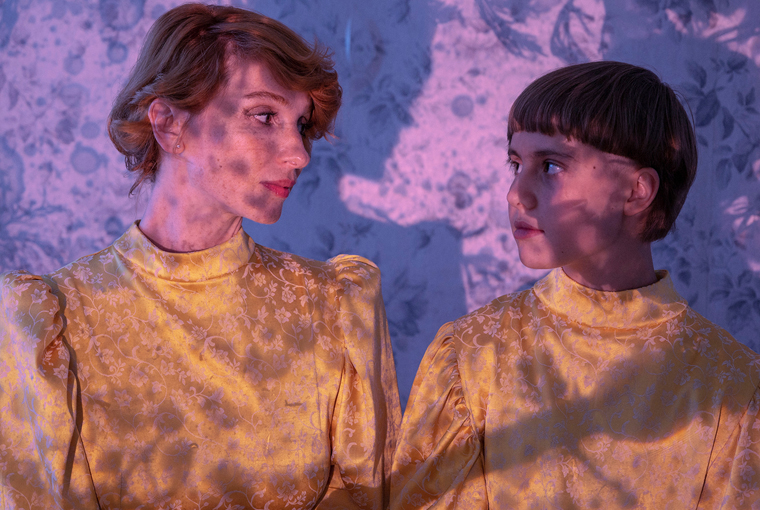Three Women and the End of the World
Cristina Groșan’s Ordinary Failures (Běžná selhání, 2022)
Vol. 135 (May 2023) by Mihai Fulger
At the 20th edition of the Crossing Europe Film Festival Linz, the competition featured Ordinary Features, the second feature film of Romanian-Hungarian director Cristina Groșan. Her debut Things Worth Weeping For had been released just one year earlier. Ordinary Failures is a Czech-Hungarian-Italian-Slovakian co-production. Groșan had started developing the project as early as 2018 together with screenwriter Klára Vlasáková. The film premiered in the “Giornate degli Autori” section of the oldest film festival in the world – the Venice Biennale –, where Groșan received the “Best Director under 40” award. Subsequently, Ordinary Failures was selected at several major film festivals, among them Crossing Europe.
Spoken entirely in Czech, Ordinary Failures was shot in Prague and the Plzeň region, but even spectators familiar with the sights of the so-called “Golden City” and its area will find it challenging to identify the filming locations. The unnamed city on screen is predominantly shown to be a human creation, albeit one deprived of much of its history, with brutalist concrete and glass buildings dominating the downtown and luxurious residential neighborhoods situated on the outskirts. And it is precisely the concomitant alienation from nature, in favor of the functional and artificial, that can be seen as the primary cause of the forthcoming apocalypse depicted on screen – Cristina Groșan’s second feature can indeed be incorporated into the “disaster films” genre, too.
Dramaturgically, Ordinary Failures belongs to a type of films with discontinuous narrative threads that are creatively combined. There are three female protagonists of different ages, each with her own chapter (and, obviously, her own goals and motives). They are followed successively during the same day, and in the last section of the film, when the pace of events precipitates, their paths are no longer treated separately but alternated. Cristina Groșan and Klára Vlasáková create several internal rhymes between the chapters in which their protagonists independently face “ordinary failures”. For example, all three women are forced to attend a planned or improvised gathering intended to be festive, when each of them would give anything to be anywhere else.
Hana (played by popular Czech actress Taťjana Medvecká) has recently lost her husband, but she cannot admit that she is struggling and needs help. She finds herself at an unexpected farewell party, as the management of the magazine she has been editing for years wants her to retire. Therefore, Hana runs like hell, desperately attempting to postpone the inevitable.
Tereza (Nora Klimešová, excellently cast) is a teenager with great difficulties integrating into the school environment, and her classmates find her weird. When she turns 13, her mother insists on throwing her a birthday party with many guests in the garden of their house. But Tereza uses every excuse she can find (ranging from the mysterious calamity in the city to the family’s pregnant cat) to escape her obligations as a party host.
Silva, played by Beáta Kaňoková, who masters the most demanding of the three roles, is the “primary parent” of a lesbian couple. She feels overwhelmed by the responsibilities bestowed upon her and looked down upon by other mothers. Compelled to take her son to see the child of a wealthier family, whom he had hurt (probably after being insulted), to ask for forgiveness and offer a gift, Silva becomes a victim of prejudgment once more. Yet she must hide her resentment.
All the main characters start their morning by being confronted with chilling news: the center of their city was the scene of a powerful explosion with an unknown source. However, they do not pay much attention to it, being more concerned about their personal anxieties. In the initial sequences, the director privileges her spectators, giving them the apparent explanation of the catastrophe: a meteorite crashing onto the earth’s surface. Then, the sky literally cracks open with purple iridescence. However, several hours pass until the characters watch the sky and realize that their world is irremediably changing. In the end, the innocent eyes of the children and the voice of elderly Hana end up conveying the film’s message (essentially confident in the possibility of transformation). The message is anticipated by the motto chosen by Cristina Groșan, a quote from feminist scholar Donna J. Haraway: “Our task is to make trouble, to stir up potent response to devastating events, as well as to settle troubled waters and rebuild quiet places.”
As an apocalyptic dystopia (in which not only nature but also technology seems to rebel against people), Ordinary Failures stands out by focusing on the psychology of its protagonists. Cristina Groșan is more interested in depicting the evolution of the three women and their journey to self-acceptance than the impact of the cataclysm on humanity. The filmmaker resorts to special effects (VFX) with temperance (evidently, the budget of this European co-production is not comparable to that of a Hollywood blockbuster either), and when using them, they prove their effectiveness, enhanced as they are by authentic footage (for example, of the tornado that had struck South Moravia in 2021). In addition, Cristina Groșan creates miniature images of destruction using trivial objects, such as paper ornaments, a kitschy accessory, or a landline phone.
Through this project, the director resumes her fruitful collaboration with two professionals with whom she had also worked on her debut: DoP Márk Győri and editor Anna Meller, both Hungarians. Pan and tracking shots, initially slow and contemplative, are gradually replaced by dynamic, alertly cut episodes. Varying the perspective (say by resorting to point-of-view shots of a robot dog, a symbol of the past that refuses to die), the filmmaker also manages to capture extreme close-ups significant for the protagonists and their social environment. Among the emotional moments of the climax, the one in which Silva and her partner reunite with their child, the camera lingers on Tereza witnessing the scene, which enhances the strength of the sequence in a surprising fashion. The music by Slovak composer Jonatán Pastirčák is either adapted to the profiles of the protagonists or eerie and threatening when the signs and consequences of the calamity appear on screen (although the angelic choir at the end reinforces the hope for change).
Through Ordinary Failures, Cristina Groșan proves herself a filmmaker proficient in telling a convincing story without going to unnecessary lengths, and in building a coherent universe populated by credible characters. Her precise, skilled directing, particularly for a film production of this magnitude, justifies the award received in Venice. At the same time, tackling a more ambitious subject, Cristina Groșan succeeds in providing sufficient intense and lyrical moments and stimulating topics to make her new film a memorable cinematic experience. Moreover, open to the audience, Ordinary Failures has no shortage of comic moments (especially in Hana’s chapter, with its anti-corporate satire), balancing out the prevailing dramatic tone.




Leave a Comment